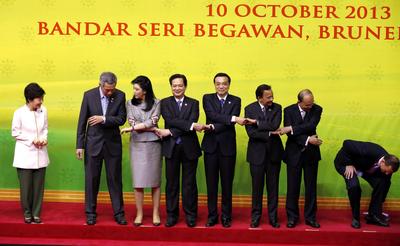When ASEAN was established in 1967 its focus was on regional security. ASEAN’s institutional set-up and its basic governance principles still reflect this original purpose. Yet ASEAN’s central functions have since shifted toward economic and social issues which require more flexible, efficient and timely decision-making. If ASEAN wants to remain relevant while strengthening its competitive edge vis-à-vis China and India – two recurring themes across recent Summit meetings – it needs to reform its basic governance principles.
Reform is needed in a few key areas. First, more powers need to shift from national to regional institutions, particularly the Secretariat. The ASEAN Economic Community has a set of rules and regulations that need to be standardised and harmonised. Ensuring that member states comply with their commitments will also require a common agency to be empowered with proper monitoring functions and sanctioning ability. More powers should also be delegated to the ASEAN Chair and the Secretary General to effectively represent the group’s interest in international meetings such as the G20. Countries eventually need to realise that there are some areas where they can gain from substituting national sovereignty with regional governance.
Second, decision-making needs to be more flexible. Adopting a qualified majority for day-to-day operational issues that need to be solved quickly would prevent small minorities from blocking important resolutions that would benefit many members. Several functional institutions such as the ASEAN Infrastructure Fund, the ASEAN+3 Chiang-Mai Initiative Multilateralization and the Credit Guarantee Investment Facility have already adopted decision-making systems that combine consensus for fundamental issues with qualified majorities for operational ones. Similar systems should be applied by ASEAN institutions more widely.
Third, the dramatically increased scope of operations introduced by the Charter and the ASEAN Community Blueprints require a corresponding expansion in the Secretariat’s human and financial resources. Yet the principle of equal contribution imposes a low ceiling on the budget as the smallest economies have limited capacity to pay. To meet its expanded needs, ASEAN must move toward a system of diversified contributions based on both the capacity and the willingness of member states to pay. Relying heavily on external sources of funding is not sustainable in the long-run, and several options applied by other regional institutions are readily available.
Fourth, the human and financial resources available to the Secretariat need to significantly increase. In 2012, the Secretariat had a budget of approximately US$16 million, and only 70 out of its 300 employees were professional staff. Yet a background paper to a soon-to-be-published ADBI study, ASEAN 2030: Toward a Borderless Economic Community, calculates that by 2030 the Secretariat will need a yearly budget of at least US$220 million and more than 1600 employees.
Strengthening human resources will also require better quality staff. ASEAN leaders should consider establishing an ASEAN Academy to form their original brand of civil service – a highly qualified regional bureaucracy capable of planning, introducing, and managing the reforms, rules, and regulations in the Blueprints for the three communities. Such an institution would offer capacity-building programs in a wide range of areas, focusing on both technical as well as regional matters. The headquarters of the Academy could be located in any member state willing to champion its cause. Branches could be attached to existing structures and opened in all member states.
Indeed, creating an ASEAN Academy could be an excellent example of new functional institutions following an approach of regional decentralisation, where hosting countries set up common agencies, provide their premises and contribute a larger part to their budgets than other member states. This is another area where ASEAN needs efficiency updates. Tourism, disaster risk management, finance, environmental mitigation and adaptation, natural resource management, health and the spread of infectious diseases are among the many functional areas that need new ASEAN institutions.
Promoting closer institutionalisation and updating ASEAN’s basic governing principles does not mean the association should become like the EU. The distance between ASEAN and the EU remains wide: Jakarta is not the Brussels of the East and ASEAN’s plans do not include creating strong regional agencies independent from member states. ASEAN has simply reached the point where its institutional set-up urgently needs structural reform to remain relevant to its member states, Asia, and the world.
Dr Giovanni Capannelli is Principal Economist and Special Adviser to the Dean, Asian Development Bank Institute, Tokyo


An excellent analysis of various and urgent upgrades for Asean during this critical phase of development and its place in growing regional and global powers conflict. Given issues are numerous and resources are scarce, what may be needed is a list of priority that either providing early successes or better return on investment.
Asean economies are uniquely growing, Chinese aggression is continuing, the external competition ( EU, Japan, US…) for regional influences are picking up steam and the political/economic diversities among members are widening… Asean has no time to waste to regain its relevance.
Thank you, Henry, for your comment. I agree with your analysis. Actually an ASEAN with a stronger institutional set-up and more internally funded resources is beneficial to other countries as well (US, EU, China, India, Japan, etc.) as it plays a unique role as ‘honest broker’ in the region. Perhaps you can make internal pressure to create a local constituency pushing for strengthening ASEAN from within.